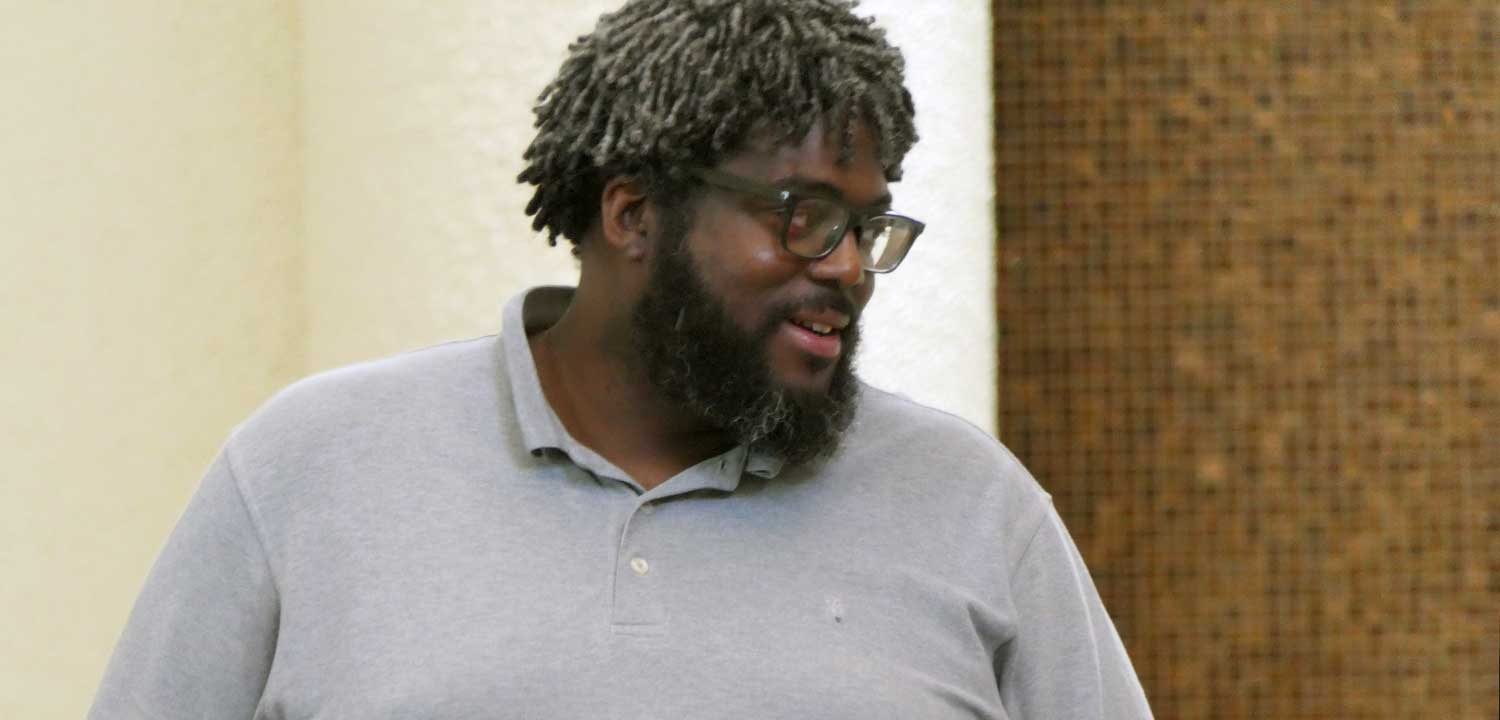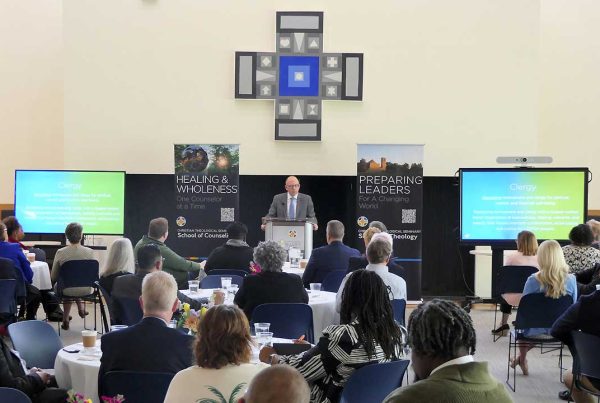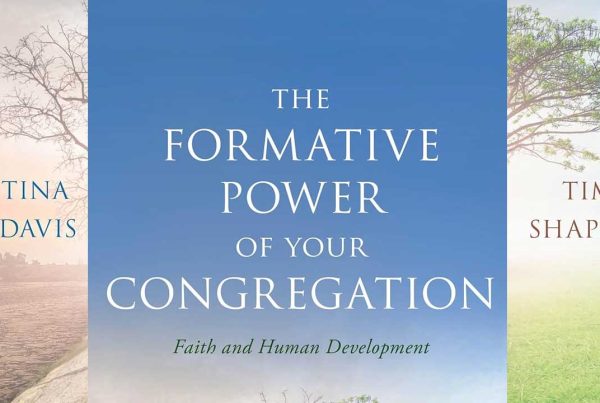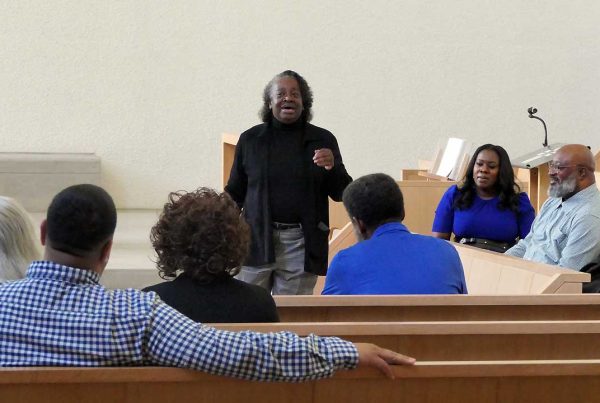Faculty Corner: Meet Dr. Peterson
Dr. Nick Peterson, CTS Assistant Professor of Homiletics and Worship and Assistant Director of the PhD in African American Preaching and Sacred Rhetoric Program, has hit the ground running since joining the CTS community in July 2023. As a practical theologian, Dr. Peterson interrogates how intentional and unintentional practices shape Christian identities and configure worldviews. Teaching in the areas of preaching and worship, he is acutely interested in the ways biblical interpretation, tradition, culture, and social location inform public proclamation and liturgy.
Peterson enters the classroom with a great deal of both pedagogical and practical experience, having taught many courses and served congregations his entire career. He believes his pastoral experience is of utmost importance in his teaching, as it has made him committed to the regular life and rhythm of the local congregation and helps him better understand the contexts his students serve in. “In theological education, I understand through experience what it’s like to get the call at 2 in the afternoon that someone passed away, asking to meet a congregant at a funeral home, and then transition to teaching students the next day about the concept behind a 4-page sermon, or the formation of sacraments in the medieval period. Pedagogically, I’m really grounded in trying to establish with my students these regular practices and rhythms of navigating the ministerial life and the life of faith. Theological education not just about doing abstracted intellectual work for the sake of doing it. We are also trying to cultivate practices that enable us to do what we’ve been called to do. What are the rhythms of care, preparation, and excellence that really smooth out the twists and turns that this journey will entail?” asks Peterson.
This fall, Dr. Peterson is teaching his first CTS course: Intro to Worship. He describes the course as a survey of Christian worship, considering both historical conversations and cultural/artistic conversations about what Christian worship is and how it has been practiced across time and space. It is also a chance for students to gain practical skills in planning, designing, and leading worship services. Most of the students in the course are currently working with congregations and are involved in planning and leading worship services. The course helps students gain a formative understanding of Christian worship while also giving them the opportunity to build practical skills they can use in their current contexts. It is a required course for the MDiv degree program, but the course also includes students from the School of Counseling.
“This course is very much an opportunity to better understand one’s own individual confession and convictions with theology and particularly theology as it comes into worship through a comparative framework. Each student comes to the class with a wealth of understanding, a wealth of experience, and a willingness to engage with one another,” he shares. “The course is going well so far. Our first meeting was on Thursday, August 24. It is an extremely diverse class of 13 students who come from and represent communities from Quaker to Pentecostal, from Muslim to United Methodist and DOC. The students are also diverse in age ranging from their 20s to 70s. We have black, white, and Latino students at the table – it captures a great cross section of our campus community. That diversity allows us to explore what can we learn in our own particulars based on what we learn of our colleagues’ particulars.”
Peterson has experience teaching Intro to Preaching courses. At the end of one such course he taught previously, students were asked to preach a funeral homily. Dr. Peterson shares that he pulled from the local headlines stories of tragedy, asking each student to preach a sermon for a real-life funeral to help them understand their duty and task to be ready to give an account at any point in time of a member of the community, whether they know them well or not. He believes this gives students practical experience in a skill they will need in ministry. “As a pastor, you need to be able to offer a spirit of witness to someone’s life, and you don’t have 6 months to prepare it. Often you have less than 6 days to develop a homily,” he says. “Students often protest this assignment, saying it is too traumatic, but it is something that happens in real life and a skill they will be grateful for. I got a message from a student who is now a chaplain in the army that this experience was perhaps the most important and helpful of his first year of seminary. He was able to use that ministering on base during times of crisis, offering comfort and witness to his unit, the families of the deceased, and the servicemen and women who were injured. I think it imperative that we ask, ‘How do we use what we’re learning here to turn towards the spaces where we will be called to show up?’ Now is the time to prepare so that when you are in that moment you will have something at hand.”
In addition to his role as Assistant Professor of Homiletics and Worship, Dr. Peterson serves as Assistant Director of PhD Program in African American Preaching and Sacred Rhetoric. He reflects, “My training is not only in homiletics but also in worship and practical theology. I’m excited to see how that provides unique support to students interested in those things. The PhD Program is designed to prepare people to teach and preach in academic and practical capacities. Dr. Thomas and Dr. Buggs set into motion an academic program that is without peer, that prepares students by helping them engage people who are out in the field doing what those students hope to do. I’m excited to continue and strengthen the work that Dr. Thomas and Dr. Buggs began.”
Peterson and his family (spouse NaKisha and twin sons Zayden and Zander) moved to Indianapolis from Atlanta. He shares that he is Midwest born and bred, hailing originally from St. Louis, so the pacing and hospitality of Indy feel familiar and a bit like coming home. He shares, “My family has only been here for a couple of weeks, but everywhere I’ve gone and talked about CTS, there are people who know someone connected with CTS. It’s great to see the goodwill that the community and surrounding region has for this school. It’s been a passport of sorts. Our kids love their school, which was big for us because they really loved their school in Atlanta. They are thriving and doing well. We are in the process of purchasing a home here and looking forward to that as well.”
Outside of teaching, Dr. Peterson enjoys live music. As a musician, he is classically trained in double bass and also plays keyboard instruments including the piano and organ. His own faith practice is very connected to humor – the subtleties of humor and how truth can be revealed in it. “One of my pastimes is paying attention to nuance and finding the humor in any given situation. I like to call attention to that which we probably would not attend to without humor calling attention to it in a sort of side-splitting way,” he shares. “Beyond that, my wife and I love to travel and love to eat. We have enjoyed getting a taste of Indy, trying out various restaurants, particularly those along College Avenue and near Illinois and 56th Street.”
Dr. Peterson’s office is #253 located on Faculty Row. He looks forward to getting to know students, colleagues, and coworkers throughout the year. When asked what he is most looking forward to, he says, “I’m excited to come during a time when CTS is really making some unique and bold strides in theological education, especially as it pertains to having both a School of Theology and a School of Counseling, offering graduate programs and doctoral programs. I’m excited to be a part of a smaller community that’s making a big impact.”
Dr. Nick Peterson holds a PhD from Emory University, a Master of Divinity from Lancaster Theological Seminary, and a Bachelor of Arts from Franklin & Marshall College in Africana Studies and Business Management. His doctoral dissertation, On Being an Issue of Delores: A Meditation on Black Faith in an Antiblack World, explores how black faith engenders intramural care practices, which he refers to as black-on-black care. This transformative care contends with and sometimes exceeds the constraints of antiblackness. Dr. Peterson is an ordained Elder in the African Methodist Episcopal Church and has served broadly in the local church as assistant pastor, pastor, minister of music, and youth minister. He has a demonstrated commitment to ecumenism and has served in Presbyterian, Pentecostal, Mennonite, United Church of Christ, and United Methodist church contexts.






